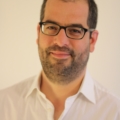Florian Stengel, PhD, studied biochemistry at the FU Berlin and completed his diploma thesis as a DAAD foreign exchange scholar with Dr. Pamela Silver at Harvard Medical School. After earning his PhD under the guidance of Dr. Carol Robinson at the University of Cambridge, he was a Sir Henry Wellcome Fellow with Dr. Ruedi Aebersold at ETH Zurich. In 2015, he started his independent career as an assistant professor and Emmy-Noether group leader at the University of Konstanz, where his group is using biochemistry and bioorthogonal chemistry, and is applying and developing integrated mass spectrometry-based approaches in order to address the modular proteome and to gain insights into the mechanistic principles of large and biologically relevant protein assemblies in health and disease. Dr. Stengel is the recipient of the 2020 Manfred Fuchs Prize of the Heidelberg Academy of Sciences and Humanities.
CO-INVESTIGATOR
Florian Stengel, PhD
University of Konstanz
Florian Stengel, PhD, studied biochemistry at the FU Berlin and completed his diploma thesis as a DAAD foreign exchange scholar with Dr. Pamela Silver at Harvard Medical School. After earning his PhD under the guidance of Dr. Carol Robinson at the University of Cambridge, he was a Sir Henry Wellcome Fellow with Dr. Ruedi Aebersold at ETH Zurich. In 2015, he started his independent career as an assistant professor and Emmy-Noether group leader at the University of Konstanz, where his group is using biochemistry and bioorthogonal chemistry, and is applying and developing integrated mass spectrometry-based approaches in order to address the modular proteome and to gain insights into the mechanistic principles of large and biologically relevant protein assemblies in health and disease. Dr. Stengel is the recipient of the 2020 Manfred Fuchs Prize of the Heidelberg Academy of Sciences and Humanities.


